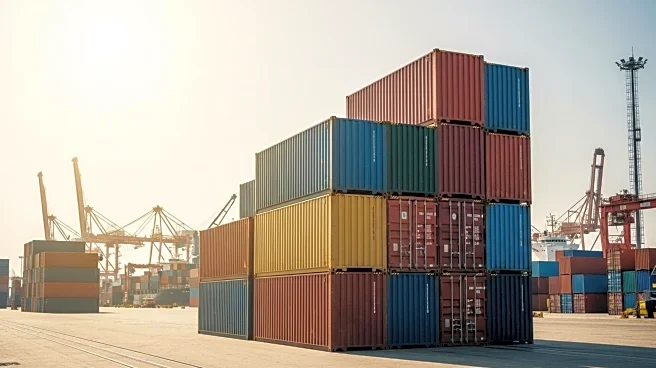What is the story about?
What's Happening?
Recent data indicates a significant decline in U.S. containerized imports for September, showing an 8.4% decrease compared to the previous year. This drop is largely attributed to ongoing trade tensions stemming from President Trump's tariff policies. Specifically, imports from China fell by 22.9%, with notable declines in aluminum, footwear, and electric machinery. Despite this decrease, U.S. seaports managed 2.31 million 20-foot-equivalent units (TEUs) of container cargo, marking the third highest September volume on record. The National Retail Federation and Hackett Associates predict that monthly import cargo volumes at major U.S. ports will remain below 2 million TEUs for the remainder of the year. The Drewry East-West Contract Rate Index, reflecting contract rates paid by multinational shippers, fell by 3% over the past year, marking the first year-over-year reduction since July 2024.
Why It's Important?
The decline in container imports highlights the economic uncertainties created by President Trump's tariff policies. These tariffs have led to shifts in trade patterns, affecting U.S. industries reliant on imports from China and other countries. The decrease in imports could impact retail and manufacturing sectors, potentially leading to higher consumer prices and supply chain disruptions. Additionally, the tariff policies may influence global trade dynamics, as countries in Southeast and South Asia increase their market share in U.S. imports. The ongoing volatility in tariff policy poses challenges for businesses planning their import strategies, affecting their ability to manage costs and inventory effectively.
What's Next?
The National Retail Federation has announced upcoming tariff increases, including a 25% tariff on upholstered furniture and kitchen cabinets, set to be implemented next week. These tariffs are expected to rise further in January. Additionally, a delayed tariff increase on Chinese imports is scheduled for November 10, unless a deal is reached or President Trump decides to delay it again. Businesses and trade associations will likely continue to monitor these developments closely, advocating for policy adjustments to mitigate economic impacts. The situation may prompt further negotiations between the U.S. and China to address trade imbalances and tariff-related issues.
Beyond the Headlines
The tariff policies not only affect economic metrics but also have broader implications for international relations and trade diplomacy. As countries adjust their export strategies, there may be long-term shifts in global supply chains, potentially leading to new alliances and trade agreements. The situation underscores the importance of stable trade policies in fostering economic growth and international cooperation. Additionally, the impact on consumer prices and availability of goods could influence public opinion and political discourse around trade policy and economic management.















